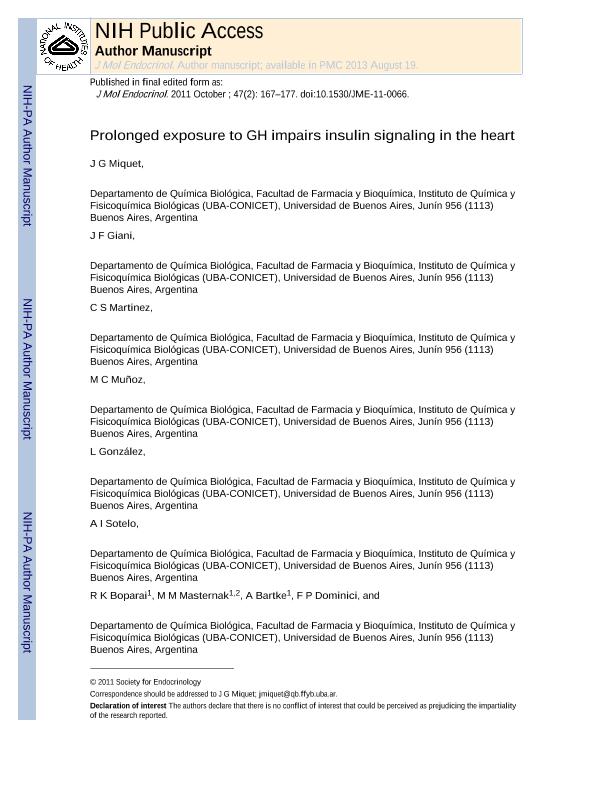Artículo
Prolonged exposure to growth hormone impairs insulin signaling in the heart.
Miquet, Johanna Gabriela ; Giani, Jorge Fernando
; Giani, Jorge Fernando ; Martinez, Carolina Soledad
; Martinez, Carolina Soledad ; Muñoz, Marina Cecilia
; Muñoz, Marina Cecilia ; Gonzalez, Lorena
; Gonzalez, Lorena ; Sotelo, Ana Isabel
; Sotelo, Ana Isabel ; Boparai, Ravneet K.; Masternak, Michal M.; Bartke, Andrzej; Dominici, Fernando Pablo
; Boparai, Ravneet K.; Masternak, Michal M.; Bartke, Andrzej; Dominici, Fernando Pablo ; Turyn, Daniel
; Turyn, Daniel
 ; Giani, Jorge Fernando
; Giani, Jorge Fernando ; Martinez, Carolina Soledad
; Martinez, Carolina Soledad ; Muñoz, Marina Cecilia
; Muñoz, Marina Cecilia ; Gonzalez, Lorena
; Gonzalez, Lorena ; Sotelo, Ana Isabel
; Sotelo, Ana Isabel ; Boparai, Ravneet K.; Masternak, Michal M.; Bartke, Andrzej; Dominici, Fernando Pablo
; Boparai, Ravneet K.; Masternak, Michal M.; Bartke, Andrzej; Dominici, Fernando Pablo ; Turyn, Daniel
; Turyn, Daniel
Fecha de publicación:
10/2011
Editorial:
BioScientifica
Revista:
Journal of Molecular Endocrinology
ISSN:
0952-5041
Idioma:
Inglés
Tipo de recurso:
Artículo publicado
Clasificación temática:
Resumen
Acromegaly is associated with cardiac hypertrophy, which is believed to be a direct consequence of chronically elevated GH and IGF1. Given that insulin is important for cardiac growth and function, and considering that GH excess induces hyperinsulinemia, insulin resistance, and cardiac alterations, it is of interest to study insulin sensitivity in this tissue under chronic conditions of elevated GH. Transgenic mice overexpressing GH present cardiomegaly and perivascular and interstitial fibrosis in the heart. Mice received an insulin injection, the heart was removed after 2 min, and immunoblotting assays of tissue extracts were performed to evaluate the activation and abundance of insulin-signaling mediators. Insulin-induced tyrosine phosphorylation of the insulin receptor (IR) was conserved in transgenic mice, but the phosphorylation of IR substrate 1 (IRS1), its association with the regulatory subunit of the phosphatidylinositol 3-kinase (PI3K), and the phosphorylation of AKT were decreased. In addition, total content of the glucose transporter GLUT4 was reduced in transgenic mice. Insulin failed to induce the phosphorylation of the mammalian target of rapamycin (mTOR). However, transgenic mice displayed increased basal activation of the IR/IRS1/PI3K/AKT/mTOR and p38 signaling pathways along with higher serine phosphorylation of IRS1, which is recognized as an inhibitory modification. We conclude that GH-overexpressing mice exhibit basal activation of insulin signaling but decreased sensitivity to acute insulin stimulation at several signaling steps downstream of the IR in the heart. These alterations may be associated with the cardiac pathology observed in these animals.
Palabras clave:
Growth Hormone
,
Insulin Signaling
,
Heart
,
Transgenic Mice
Archivos asociados
Licencia
Identificadores
Colecciones
Articulos(IQUIFIB)
Articulos de INST.DE QUIMICA Y FISICO-QUIMICA BIOLOGICAS "PROF. ALEJANDRO C. PALADINI"
Articulos de INST.DE QUIMICA Y FISICO-QUIMICA BIOLOGICAS "PROF. ALEJANDRO C. PALADINI"
Citación
Miquet, Johanna Gabriela; Giani, Jorge Fernando; Martinez, Carolina Soledad; Muñoz, Marina Cecilia; Gonzalez, Lorena; et al.; Prolonged exposure to growth hormone impairs insulin signaling in the heart.; BioScientifica; Journal of Molecular Endocrinology; 47; 2; 10-2011; 167-177
Compartir
Altmétricas



